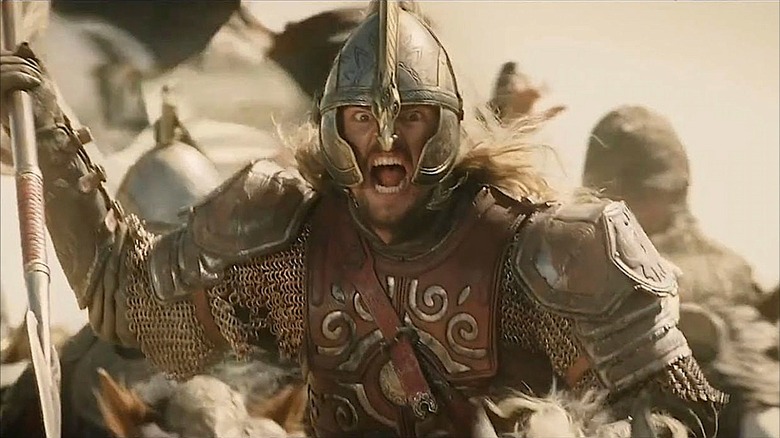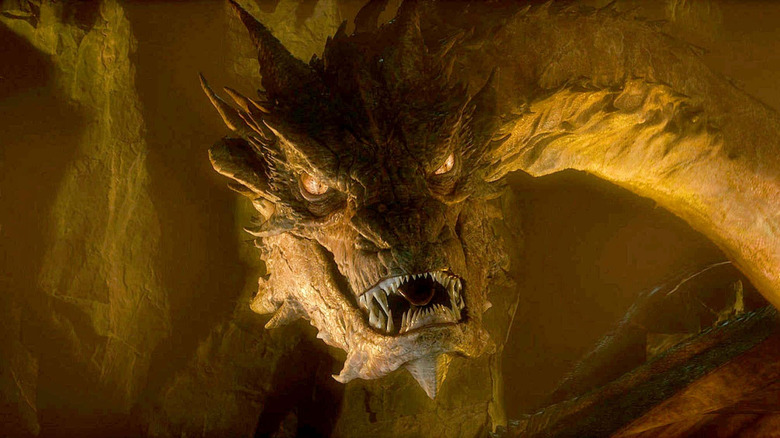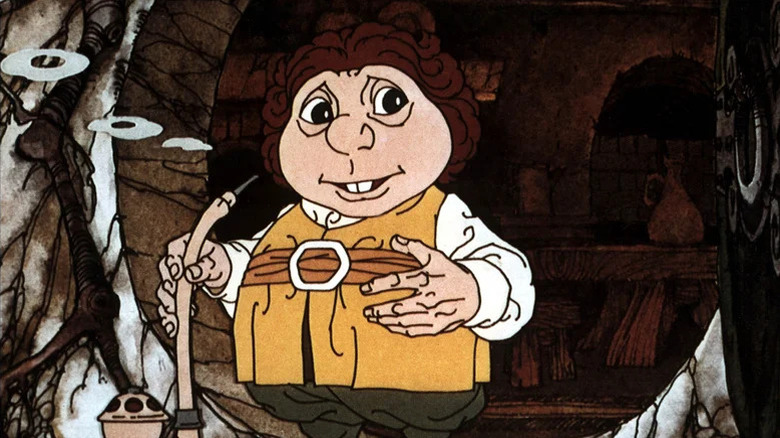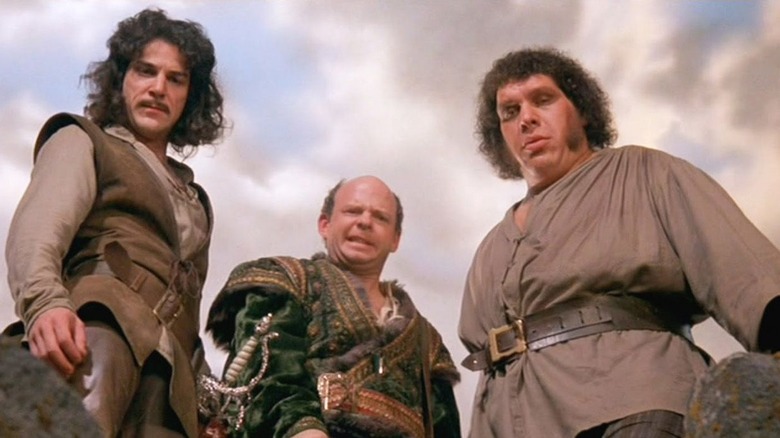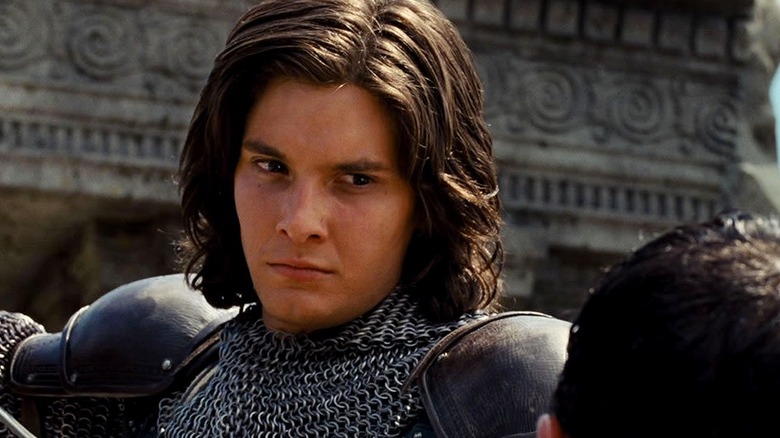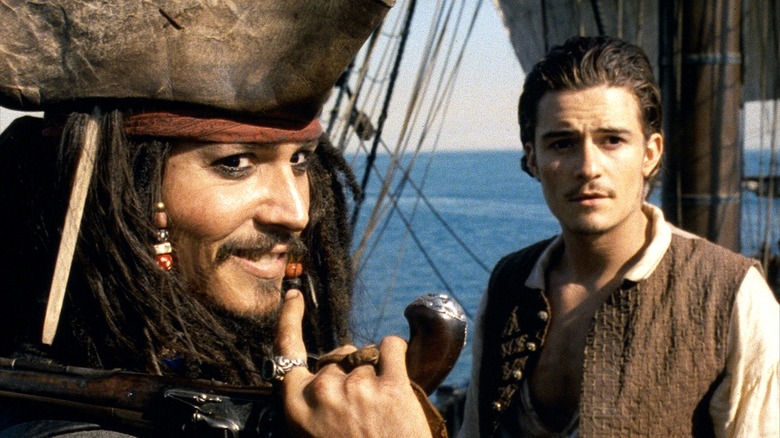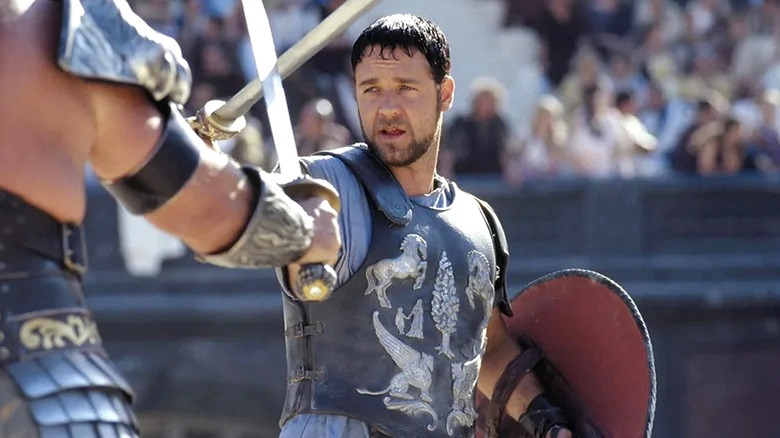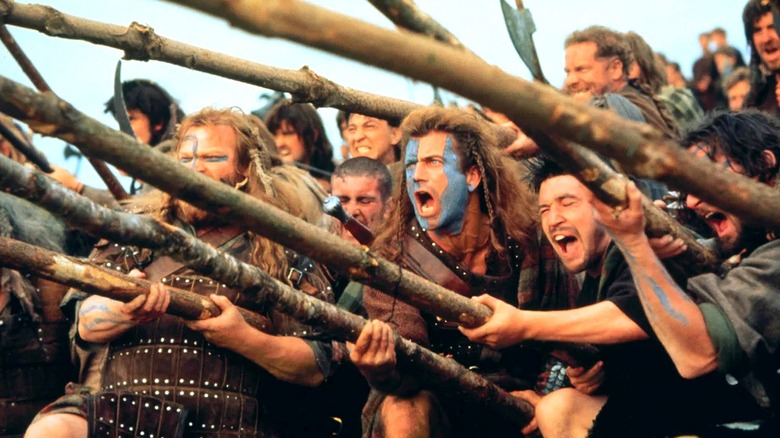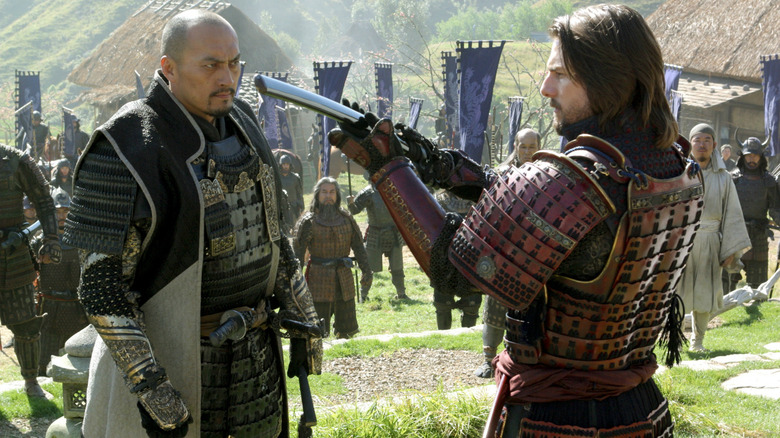8 Good 'Sword And Board' Movies To Watch After Lord Of The Rings
There are few truly epic, swashbuckling, high-fantasy films as highly acclaimed as Peter Jackson's "The Lord of the Rings" trilogy. That classic adventure brought fantasy adaptations into the mainstream while simultaneously introducing audiences to incredibly long theatrical runtimes. The "Return of the King" even won every Academy Award it was nominated for. Taken together, the experience was a complete and enduring win for fantasy fans everywhere, and they have continued to dominate the genre in the decades since they were released.
So, where do you go from there? Where can you find another fun-loving experience once Sam gets back to Bag End, the camera fades, and the endless credits start to roll? (Seriously, those films must have the name of every single person in New Zealand in them.)
If you're itching to keep the good times rolling, here are some of the best sword and board movie recommendations to consider next in your lineup. Some of these stick to the Middle-earth theme. Others are similar fantasy recommendations. Still others channel that fantasy epic feel in real-world settings. A few are on the grittier side, but really, we're going to hone in on fun, lighthearted, epic romance concepts with most of these. We'll also avoid television series like "The Rings of Power" or "Game of Thrones" and stay focused on the three-act movie format. Ready? Let's do this thing.
The Hobbit trilogy
While you're on a Middle-earth kick, why not keep things rolling with a prequel? Better yet, another trilogy of prequels! Peter Jackson's "The Hobbit" trifecta is a great way to maintain those Tolkienian feels. The three-movie format gives it a similar feel to "The Lord of the Rings," and it also features some of the same characters, including Ian McKellen's Gandalf, Christopher Lee's Saruman, Cate Blanchett's Galadriel, and Orlando Bloom's Legolas.
Now, if we're being honest, this trilogy is significantly lower in quality than Jackson's original "Lord of the Rings" films. The simple option to split up the short, single book into a three-part bonanza makes a lot of the storytelling feel scattered and overextended. Over-reliance on not-quite-there-yet CGI also drags many sequences into the uncanny valley. Even so, there is a lot to enjoy here, with Benedict Cumberbatch's Smaug standing out as particularly good. If you want to spend another extended period of time in Middle-earth, you can't go wrong with a nine-hour marathon of the "Hobbit" trilogy extended editions that function as a fun prequel to the one trilogy to rule them all.
The animated Lord of the Rings and Hobbit classics
If you're jonesing for an endless stream of that Tolkien magic, you can also go back to the animated classics. Yep, there are animated versions of both "The Lord of the Rings" and "The Hobbit," and they're, well ... they're definitely an experience.
The animated "The Hobbit" is a movie made for television. It is a succinct (by Middle-earth adaptation standards) 90 minutes on the nose and features a fun take on actually overweight Hobbits (which is canon accurate), grumpy old Wizards, a truly terrifying Gollum, and even a wild, wrinkled, green-skinned take on the Wood-elves. Honestly, this one movie might be a better prequel to Jackson's trilogy than the bloated "Hobbit" triple entente if you wanted to rank them all — but we digress.
Along with the animated "Hobbit," there is the two-part animated "Lord of the Rings" experience. The first of these was made in 1978 by legendary animator Ralph Bakshi and is simply titled "The Lord of the Rings." It covers a good chunk of the trilogy but has a cliffhanger ending. The animated movie "The Return of the King" was produced for TV by Rankin/Bass (who made the animated "Hobbit") in 1980, and while it doesn't technically go with Bakshi's version, the two movies combined do give you a more-or-less complete experience. Again, none of these are going to hit home like Jackson's trilogy, but if those convert you to the Tolkien fandom, these animated classics are a fun next step.
The Princess Bride
If your heart leaps at the swashbuckling nature of Tolkien's "Lord of the Rings," and the sword fights and epic overtones have you wanting to jump up off the couch and run out of the door in search of adventure, then you've got to go to the 1987 film classic "The Princess Bride" next. Folks, this movie has it all. Sword duels, giants, evil kings, damsels in distress, epic chases, masked avengers, outnumbered rescue attempts, long-awaited revenge — do we need to keep going?
Seriously, when William Goldman first penned the novel back in 1973 and then turned it into a screenplay a decade and a half later with Rob Reiner in the director's chair, it was a recipe for cinematic gold. The resulting movie had everything promised in the subtitle of the published first edition: "S. Morgenstern's Classic Tale of True Love and High Adventure, 'The Good Parts' Version." Yeah, this thing has it all. It is a feel-good story of epic proportions, even as it plays to the demands of fun-loving fans and family-friendly humor. It is truly one of the greatest masterpieces to come from the '80s. It is a modern classic in and of itself (the book came out just a couple of decades after "The Return of the King" was published) and is a great way to keep channeling that Tolkienian sword and board fun.
The Chronicles of Narnia
If you're looking for another movie experience that's in-genre but not in Tolkien's world, look no further than "The Chronicles of Narnia" films from the 2000s. The first installment, "The Lion, the Witch and the Wardrobe," is a Walt Disney Pictures production that was released in 2005, making it already a two-decade-old movie. It's an admittedly more toned-down, family-friendly experience than "The Lord of the Rings." But it has that same high-fantasy charisma, likely because the creators of Narnia and Middle-earth (C.S. Lewis and J.R.R. Tolkien) were besties in real life and helped each other with shared interests, feedback, and encouragement.
While it technically skips the first book in the series ("The Magician's Nephew"), "The Lion, the Witch and the Wardrobe" is the first movie in the series and serves as a fun Narnia entry point. It maintains a truly epic atmosphere even as it shifts gears from larger-than-life "Lord of the Rings" characters to a quartet of lead actors who are all kids. If you like this one, you can follow it up with "Prince Caspian" (featuring a young Ben Barnes of "Shadow and Bone" and "Cabinet of Curiosities" fame) as well as "The Voyage of the Dawn Treader."
Be warned, these latter films tend to decline in quality and accuracy to the source material as they go along. Still, the trilogy is a fun romp through a high-fantasy world that has captivated viewers of all ages for decades. (Hopefully, Greta Gerwig's upcoming relaunch of the faith-based IP will be able to capture that same magic once again.)
Pirates of the Caribbean
Disney's "The Pirates of the Caribbean" franchise is another excellent option if you're in the mood for a swashbuckling, over-the-top experience. In this case, you can start with director Gore Virbinski's original Pirates flick: "The Curse of the Black Pearl." This is a stellar romp through piratical New World waters that provides a well-rounded story. It introduces the characters, sets the stakes, and resolves the plot.
On the one hand, if you find that one movie is enough of a chaser for that "Lord of the Rings" experience, you're good to go. On the other hand, if you just can't stop binging on that sword-and-board thrill, there are four more movies in the series (with a potential sixth one floating on the ethers of Hollywood production). The first three of these movies form yet another "Lord of the Rings"-esque trilogy arc, and, as an added flourish, one of the key characters is Legolas actor Orlando Bloom, who plays Will Turner in the seaborne series based on the iconic Disney theme park ride.
Gladiator
We said there would be some grit, didn't we? Well, here it comes. "Gladiator" is a violent story set in the vicious Colosseum (and similar arenas) of ancient Roman times. The semi-historical tale follows the fictional character Maximus (Russell Crowe) as he navigates the loss of his family and the rise to power of one of the baddest dudes in real Roman history: Commodus (Joaquin Phoenix).
This one came out a year and a half before "The Fellowship of the Ring," and it has a very similar movie-making feel. There are occasional uses of CGI, but overwhelmingly, we're still in practical effects territory. The heart-stirring performance by Crowe and the truly despicable depiction of Phoenix's Commodus make this a movie where you can honestly root for the good guys to defeat villains and overcome the impossible odds — a very Tolkien angle, and one that is hard to find in most modern, cynical storytelling narratives.
The movie may be historical in nature, which deviates from the fantasy element, but in reality, director Ridley Scott had no problem introducing historical inaccuracies if they improved the "Gladiator" plot. Even better? Tolkien loved historical storytelling — accurate or otherwise. In the foreword to the "Lord of the Rings," the author explicitly states that he cordially dislikes allegory, adding, "I much prefer history, true or feigned, with its varied applicability to the thought and experience of readers." Toss in the fact that "Gladiator" is getting a Scott-helmed sequel a quarter of a century later, which equates to a longer total runtime, and this is an easy addition to a post-"Lord of the Rings" watch list designed to keep the good times rolling.
Braveheart
To round out our list, we have two recommendations that hone in on one aspect of "The Lord of the Rings" in particular: the tragedy of it all. At its core, "The Lord of the Rings" is as much a story of sorrow as it is of hope. Sure, the good guys rally and defeat Sauron, but the Elves ultimately have to diminish, passing away into the West.
"Braveheart" is a story with a similar bittersweet, melancholic note of victory that comes from heroic feats, desperate victories, and epic endings. The 1990s wartime classic traces the rise of Scottish freedom fighter William Wallace (Mel Gibson) as he rallies his people to resist the tyrannical power of the English under King Edward Longshanks (Patrick McGoohan). The movie progresses through a smorgasbord of emotional beats, from tragedy and loss to the thrill of overcoming the odds to gut-wrenching defeat, betrayal, and heroic deaths. It's a movie experience that hits you in all the feels, just like Peter Jackson's trilogy.
The Last Samurai
The other tragedy-laced epic we need to include here is "The Last Samurai." The Tom Cruise-led flick primarily takes place in late 19th-century Japan, where industrialization is making the classic Samurai way of life obsolete. Cruise's character, Nathan Algren, joins forces with the traditionalists as they fight to defend their fading form of life and resist the inevitable march of time, mechanization, and progress.
The movie has a lot of introspective elements. Algren's character arc rises from depression to hope, and he finds redemption from past transgressions. But the element that really gives this film a particularly strong Tolkienian resonance, though, is the fight between the old world and modern technology. The sword and shield charges against muskets and machine guns give it an epic "Lord of the Rings" vibe and make it an emotional roller coaster that makes this adventure a perfect follow-up watch after the ups and downs of Jackson's trilogy.
